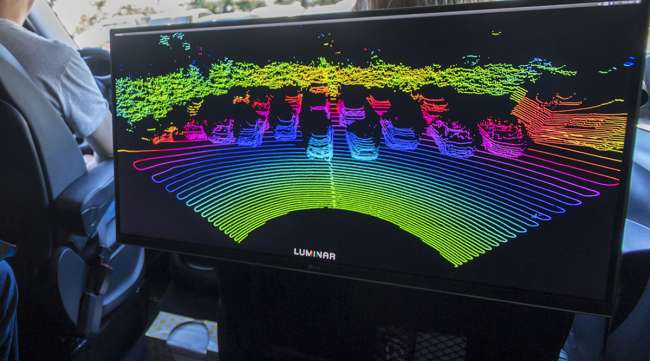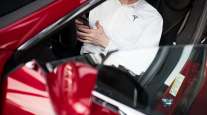Tesla Tests Lidar, Which Musk Once Scorned

[Stay on top of transportation news: Get TTNews in your inbox.]
Tesla Inc., whose boss Elon Musk says he can develop a fully self-driving car without using laser-sensor technology, has a contract to use such sensors from Luminar Technologies Inc. for testing and development, according to people familiar with the matter.
A photo of a Tesla Model Y with a roof rack of lidar sensors posted to Twitter on May 20 stoked speculation that the companies were working together, sending Orlando, Fla.-based Luminar’s shares up more than 10% that day. While similar images of Teslas with lidar sensors have popped up before on social media, it was unclear until now what the relationship is between Tesla and Luminar.
Luminar sold Tesla the sensors on that Model Y as part of an agreement between the companies, some of the people said, requesting anonymity because the information is private. In addition, Bloomberg News confirmed with the California Department of Motor Vehicles that the manufacturer’s license plate on the photographed vehicle belongs to Tesla. The same manufacturer’s plate has been spotted on other Tesla vehicles, including a prototype of the forthcoming Cybertruck.

Next-level technologies hold the potential to enhance safety and efficiency in transportation, but it takes a lot of work behind the scenes to advance these ideas from concept to reality. We talk with Christoph Mertz of the Robotics Institute at Carnegie Mellon and Huei Peng of the University of Michigan. Hear a snippet above, and get the full program by going to RoadSigns.TTNews.com.
Luminar rose in early trading May 24. A Luminar representative declined to comment. Multiple Tesla executives contacted by Bloomberg didn’t respond to a request for comment. Tesla has disbanded its media relations department.
The Model Y with the sensors was spotted in Palm Beach, Fla., around 8 a.m. May 20 by Grayson Brulte, a consultant to the autonomous-vehicle industry who lives in the area. The photos he posted to Twitter fanned market speculation that CEO Musk might be hedging his claim that he can develop a camera-only self-driving system, without the radar and laser sensors embraced by competitors.
Luminar’s shares pared a gain of as much as 9.8% to trade up 4.7% to $22.42 in early morning trading in New York. The stock had surged on May 20 to the highest level in more than three weeks and its ticker symbol, LAZR, was shared widely on Twitter in speculation that it had supplied the sensor suite.
It’s not clear what Tesla’s intentions are with Luminar’s lidar, the people familiar with the matter told Bloomberg. Tesla engineers could be benchmarking their camera-centric self-driving system against lidar; they also could be testing lidar for future use.
Any suggestion that Musk would change course to adopt lidar is unrealistic, said Sam Abuelsamid, an analyst with Guidehouse Insights.
Spotted in Palm Beach, Florida. A @Tesla Model Y with #LiDAR and CA Manufacturing (MFG) Plates. Can anyone offer details/insights? pic.twitter.com/5Uh4WU0U41 — Grayson Brulte (@gbrulte) May 20, 2021
“The more likely scenario is they are using the Luminar lidars to validate their camera-based FSD system,” Abuelsamid said in an interview, using an acronym for full self-driving. “If they made that change, it would effectively deprecate their entire fleet of vehicles. They are not going to retrofit one million vehicles.”
Lidar, which stands for light detection and ranging, is a key technology for the world’s leading automakers, tech companies and startups as they race to make fully autonomous cars a reality. Lidar uses lasers to build a three-dimensional image of the surrounding landscape, which is critical to how the vehicle perceives the environment, predicts the behavior of pedestrians and other vehicles, and plans how to safely navigate roads.
Musk has been a lone, and loud, voice saying that lidar isn’t necessary.
“Lidar is a fool’s errand,” he said during Tesla’s “Autonomy Day” for investors in April 2019. “Anyone relying on lidar is doomed.”
Luminar, which went public in a $3.4 billion reverse merger last year, has production agreements to supply lidar sensors to Volvo Car AB and the flagship R brand of SAIC Motor Corp., China’s biggest automaker.
More recently, Musk has softened some of his public comments on lidar technology. In an appearance on the audio chatroom Clubhouse earlier this year, he admitted to “talking smack” about lidar and said that SpaceX — the rocket company Musk also leads — developed its own internal lidar to aid the SpaceX Dragon capsule. “Obviously if I hated lidar I wouldn’t have done that,” Musk said. “However, for driving on real world roads you have to solve vision, understanding objects.”
On an earnings call last month, Musk suggested Tesla is also moving away from radar, which, along with lidar and cameras, is one of the three technologies the industry has viewed as critical sensor hardware needed to reach a future of self-driving vehicles.
Analyst Adam Jonas of Morgan Stanley called that a bold and risky move. Jeff Osborne of Cowen & Co. went a bit further: “We continue to question Tesla’s approach to vehicle automation,” he wrote in a note to clients. “In our view this is unlikely to succeed.”
Tesla shares were little unchanged at $581.12 in early trading May 24. As of the close May 21, the stock was down 18% this year.
Want more news? Listen to today's daily briefing below or go here for more info:




